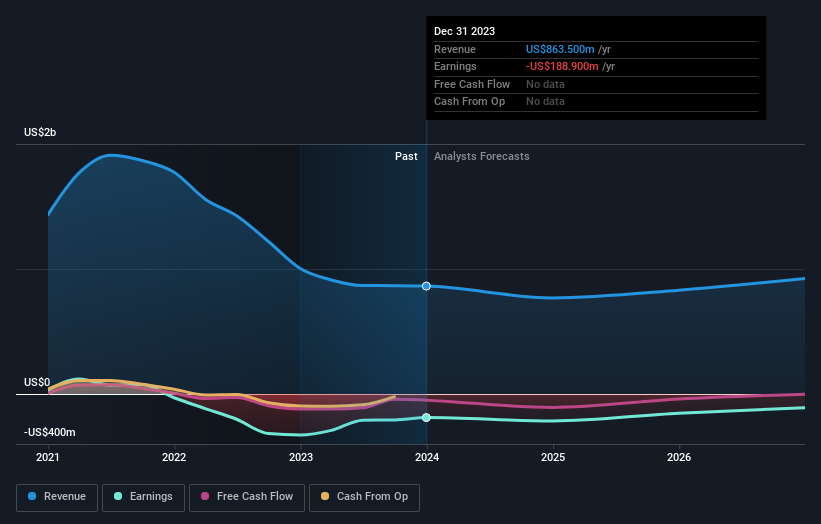Analysts Have Lowered Expectations For OPKO Health, Inc. (NASDAQ:OPK) After Its Latest Results
Investors in OPKO Health, Inc. (NASDAQ:OPK) had a good week, as its shares rose 3.1% to close at US$1.00 following the release of its yearly results. Revenue hit US$864m in line with forecasts, although the company reported a statutory loss per share of US$0.25 that was somewhat smaller than the analysts expected. Following the result, the analysts have updated their earnings model, and it would be good to know whether they think there's been a strong change in the company's prospects, or if it's business as usual. We've gathered the most recent statutory forecasts to see whether the analysts have changed their earnings models, following these results.
Check out our latest analysis for OPKO Health
After the latest results, the consensus from OPKO Health's five analysts is for revenues of US$769.0m in 2024, which would reflect a definite 11% decline in revenue compared to the last year of performance. Losses are expected to increase substantially, hitting US$0.30 per share. Before this latest report, the consensus had been expecting revenues of US$842.7m and US$0.19 per share in losses. So it's pretty clear the analysts have mixed opinions on OPKO Health after this update; revenues were downgraded and per-share losses expected to increase.
The average price target was broadly unchanged at US$4.25, perhaps implicitly signalling that the weaker earnings outlook is not expected to have a long-term impact on the valuation. The consensus price target is just an average of individual analyst targets, so - it could be handy to see how wide the range of underlying estimates is. There are some variant perceptions on OPKO Health, with the most bullish analyst valuing it at US$8.50 and the most bearish at US$1.50 per share. So we wouldn't be assigning too much credibility to analyst price targets in this case, because there are clearly some widely different views on what kind of performance this business can generate. As a result it might not be a great idea to make decisions based on the consensus price target, which is after all just an average of this wide range of estimates.
Another way we can view these estimates is in the context of the bigger picture, such as how the forecasts stack up against past performance, and whether forecasts are more or less bullish relative to other companies in the industry. These estimates imply that revenue is expected to slow, with a forecast annualised decline of 11% by the end of 2024. This indicates a significant reduction from annual growth of 1.6% over the last five years. By contrast, our data suggests that other companies (with analyst coverage) in the same industry are forecast to see their revenue grow 6.8% annually for the foreseeable future. It's pretty clear that OPKO Health's revenues are expected to perform substantially worse than the wider industry.
The Bottom Line
The most important thing to take away is that the analysts increased their loss per share estimates for next year. Unfortunately, they also downgraded their revenue estimates, and our data indicates underperformance compared to the wider industry. Even so, earnings per share are more important to the intrinsic value of the business. The consensus price target held steady at US$4.25, with the latest estimates not enough to have an impact on their price targets.
Following on from that line of thought, we think that the long-term prospects of the business are much more relevant than next year's earnings. We have forecasts for OPKO Health going out to 2026, and you can see them free on our platform here.
And what about risks? Every company has them, and we've spotted 3 warning signs for OPKO Health (of which 1 makes us a bit uncomfortable!) you should know about.
Have feedback on this article? Concerned about the content? Get in touch with us directly. Alternatively, email editorial-team (at) simplywallst.com.
This article by Simply Wall St is general in nature. We provide commentary based on historical data and analyst forecasts only using an unbiased methodology and our articles are not intended to be financial advice. It does not constitute a recommendation to buy or sell any stock, and does not take account of your objectives, or your financial situation. We aim to bring you long-term focused analysis driven by fundamental data. Note that our analysis may not factor in the latest price-sensitive company announcements or qualitative material. Simply Wall St has no position in any stocks mentioned.

